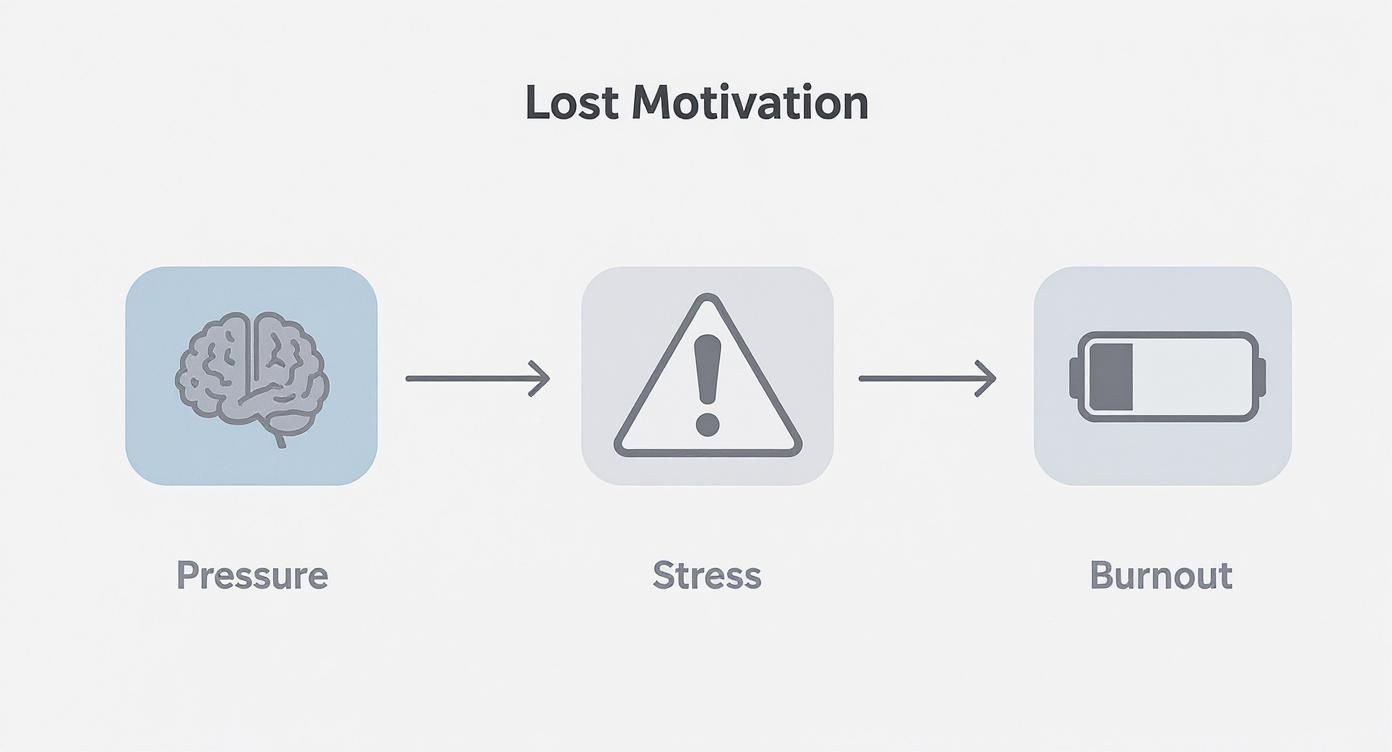
Feeling Unmotivated at Work? It’s Your Nervous System, Not a Failure.
For a high-performer, feeling unmotivated at work isn’t a slow fade. It’s a sudden, jarring halt. One day you’re firing on all cylinders, the next, the engine cuts out. You coast on fumes, wondering where your drive went. This isn’t laziness. It’s a critical signal flare from your nervous system, and it’s time to listen.
Act I – The Silent Collapse
You know the feeling. The quiet dread on Sunday night. The profound, draining emptiness staring at a calendar that once energized you. The career you meticulously built now feels like a cage. This is the Silent Collapse a state known only to those who have always delivered, always beenthe onepeople count on.
Your internal monologue becomes a battleground: “Just get through this meeting. If I stop performing, I’ll disappear.” This isn’t a character flaw. It’s a biological response to a sustained misalignment between who you are and what you’re doing.
The Science Behind Your Vanishing Drive
That hollowed-out feeling isn't in your head. It’s in your biology. When you’re constantly under pressure, your nervous system gets locked in a state of high alert. Your amygdala your brain's threat detector starts seeing every email and deadline as an imminent danger.
This floods your system with cortisol, the primary stress hormone. You sit at your desk marinating in a chemical bath designed for short-term survival, not long-term professional endurance.
This constant stress systematically depletes your dopamine reserves the neurotransmitter of reward and motivation. Soon, the tasks that once gave you a sense of accomplishment offer nothing but a flat, empty return.
You’re not unmotivated because you stopped caring. You’re unmotivated because the neurochemical circuit that makes youfeelthe drive to care has been dismantled.
Your brain makes a critical choice: conserve energy or burn out completely. The feeling of being unmotivated at work is your nervous system choosing self-preservation. It's a biological shutdown sequence. This neurological state is the definition of burnout. Recognizing it as a physiological problem, not a personal failure, is the first step toward reclaiming your drive. For a deeper look, explore our guide on overcoming burnout at work.
Act II – The RAMS Reframe: A Path Back to Yourself
Insight alone won’t get your fire back. You need an actionable path to rebuild your foundation for a career that feels as good as it looks.
This is why I developed the RAMS™ framework. It’s a strategic roadmap from burnout back to embodied leadership. RAMS stands for Results, Attitude, Mastery, and Systems. Each pillar directly counteracts a core reason high-achievers collapse.
The slide from pressure to burnout is a predictable spiral. Intense demands snowball into chronic stress, leading to system depletion.

The RAMS framework breaks this cycle, giving you tools to manage pressure, regulate stress, and reverse burnout for good.
Pillar 1: Redefining Your Results
The first pillar, Results, targets the relentless pursuit of external validation. For years, you’ve measured success by metrics someone else handed you promotions, revenue targets, a "good job" from the boss. This hooks you on a dopamine rollercoaster you can’t control.
The RAMS approach flips this. This isn’t about lowering standards; it’s about owning them.
What would success feel like if it were measured by your sense of purpose and your energy at the end of the day? This is sovereignty you decide the metric.
This week, identify one "Sovereign KPI" (Key Performance Indicator) for yourself. A non-negotiable outcome 100% within your control.
Instead of: "Close three new deals."
Try: "Have three high-quality, energizing conversations with potential clients."
This simple shift creates a reward loopyouown, generating dopamine from internal satisfaction, not external approval. You start refueling your own engine.
Pillar 2: Shifting Your Attitude
Attitude, the second pillar, isn't about fake positivity. It’s about consciously shifting your physiological statefrom threat to safety. Chronic stress locks your nervous system in survival mode.
Your attitude is the internal weather you cultivate. RAMS uses concrete, physical practices to down-regulate your nervous system. This isn’t a mindset hack; it’s a biological reset.
A two-minute breathing exercise before a tough meeting. A five-minute walk outside to break a stress cycle. The goal is to develop the Attitude of a leader who can regulate her own state before managing external chaos.
Pillar 3: Reclaiming Your Mastery
The endless barrage of emails and meetings yanks you from the very work that gives you a sense of Mastery that deep, focused flow state where you feel competent and alive. When you feel unmotivated, it's often a direct result of being starved of this essential need.
The third RAMS pillar is about aggressively protecting time for your craft. Conduct a ruthless audit of your calendar.
What low-value meetings can you kill?
Where can you carve out a two-hour "no-interruption" zone each week for high-skill work?
Re-engaging with mastery is like giving a starving artist a clean canvas. It reminds your brain of the intrinsic reward of doing meaningful work well, creating a self-sustaining source of motivation.
Pillar 4: Building Sustainable Systems
Finally, Systems tackles the structural problems causing burnout. High-achievers burn out because they rely on sheer effort, but willpower is finite.
Sustainable success requires robust systems that act as guardrails, protecting your energy, focus, and time.
These systems include:
Energy Management: Structuring your day around your natural energy cycles.
Boundary Setting: Creating clear rules around your availability. This isn’t being difficult; it’s being professional. Learn how to set boundaries at work.
Delegation: Identifying tasks that don't require your unique genius and offloading them.
Employees are demanding this. A recent Deloitte survey showed that 60% of employees expect their organizations to help them stay motivated. You can start by taking that control for yourself.
By putting these pillars into practice, you fundamentally redesign your relationship with work. You move from reactive survival to proactive, sovereign leadership.
Act III – The Return
Feeling unmotivated at work was never the real problem. It was the final flare from a system pushed beyond its limits a sign that the old definitions of success are officially broken.
The journey from the Silent Collapse to this moment is about redesigning your relationship with ambition. The RAMS framework gives you the schematics to build a new operational model for your career one that runs on deep alignment, not cheap adrenaline.
True, lasting motivation isn’t found; it’s cultivated. It grows from self-respect, watered by non-negotiable boundaries, and illuminated by a definition of success that is yours alone.
This is what nervous-system sovereignty feels like. The quiet, unshakable power of knowing your own metrics and owning your own drive.
The ultimate goal isn’t to become a better performer in someone else’s game. It’s to create a game you are genuinely excited to play, every single day.
This path forward isn't about "getting help" it's about returning to yourself. It's about stripping away layers of expectation to reconnect with your core leadership. A powerful next step is resetting your mindset for this new chapter.
The Critical Choice: Rebuild or Walk Away?
Sometimes, feeling unmotivated is the most intelligent response to a toxic or misaligned environment. The greatest act of leadership isn’t fixing a broken situation it's having the clarity to leave it.

You must distinguish between a role that needs your renewed energy and one that is actively draining your life force. Pushing through in a fundamentally broken environment isn’t resilience; it’s self-abandonment.
Use these questions as a diagnostic:
Values Alignment: Does this company’s definition of success resonate with yours?
Growth Potential: Is there a realistic path forward here that genuinely excites you?
Psychological Safety: Can you set a boundary without fearing professional retaliation?
If you find deep misalignment in two or more areas, trying to rebuild motivation will be an exhausting, losing battle. The ultimate act of professional sovereignty is recognizing when your environment is incompatible with your well-being and having the courage to choose yourself over a paycheck.
Whether you rebuild or walk away, the choice itself is a powerful return to your own leadership.
Frequently Asked Questions
How Long Does It Take to Feel Motivated at Work Again?
There’s no magic pill. Think of it less like flipping a switch and more like recalibrating your internal compass. Rebuilding a deep, sustainable drive rooted in a regulated nervous system can take anywhere from a few weeks to several months. The goal isn't to get back to the old "hustle." It's to cultivate a new kind of drive: one that’s resilient, authentic, and built to last.
Is Being Unmotivated a Sign I Am in the Wrong Career?
Not necessarily. Feeling unmotivated at work is more often a signal of a mismatch between you and your current role, culture, or lack of growth. Before a massive career change, use the RAMS framework. Is it a lack of Mastery (you’ve outgrown the work) or are your Systems (boundaries, energy management) failing in a toxic environment? That distinction is everything. For a clearer picture, this quick burnout diagnostic quiz offers powerful insights.
Can I Overcome This Feeling Without My Boss's Support?
Yes. A huge portion of your sovereignty can be reclaimed on your own. Your internal state, where you draw your lines, and how you define success these are all within your control. Real, lasting motivation is an inside job. The RAMS framework gives you strategies you can implement by yourself. A supportive manager can accelerate things, but your journey back to motivation is not dependent on their approval.
At Baz Porter, we architect the return to your most powerful, sovereign self. If you are ready to move from burnout to breakthrough and build a career that energizes you, learn more at https://bazporter.com.
